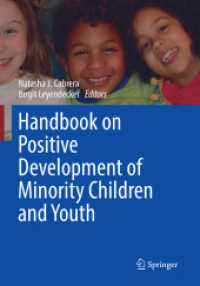- ホーム
- > 洋書
- > 英文書
- > History / World
基本説明
First full-scale investigation of an important feature of Roman diplomacy and international relations.
Full Description
This book examines hostage-taking in ancient Rome, which was a standard practice of international diplomacy. Hundreds of foreign hostages, typically adolescents, were detained as the empire grew in the Republic and early Principate. As prominent figures at the center of diplomacy and as 'exotic' representatives of the outside world, they drew considerable attention in Roman literature and other artistic media. Our sources discuss hostages in terms of the geopolitics that motivated their detention, as well as in accordance with other comparable structures of power. Hostages, thus, could be located in a social hierarchy, a family network, in a cultural continuum, or in a sexual role. In these schemes, an individual Roman, or Rome in general, becomes not just a conqueror, but also a patron, father, teacher, or generically male. By focusing on the characterizations of hostages in Roman culture, we glean Roman attitudes toward ethnicity and imperial power.
Contents
1. Introduction; 2. Creditor-collateral; 3. Host-guest; 4. Conqueror-trophy; 5. Father-son; 6. Teacher-student; 7. Masculine-feminine; 8. Polybious as a hostage; 9. Tacitus on hostage-taking and heroism.








